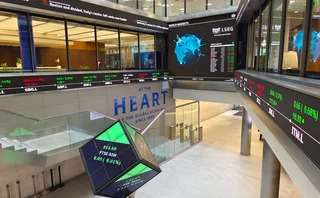
Equity house of the year: BNP Paribas
Structured Products Europe Awards 2017: Hunger for growth has driven BNP Paribas to uncover every opportunity, without compromising its keen sense for customer appetite

The European equity derivatives business is core to BNP Paribas. The bank’s prowess has supported impressive earnings numbers: its reported global earnings for equities income jumped 36% in the first quarter of 2017 and 26% in the second quarter, which helped cushion a 16% drop in Q2 fixed-income business.
As investors have turned their backs on fixed-income products and sought out yield in equity products, BNP Paribas’ distribution business has been ignited. “In 2016, the distribution business suffered, which was compensated by our institutional and corporate businesses,” explains Nicolas Marque, the bank’s global head of equity derivatives. “Now in 2017, thanks to diversification of our client base, we are taking market share as distribution business comes back.”
The company’s eminence in the distribution of equity derivatives products to a widening client base is in part a product of thinning supply. As Marque readily admits, erstwhile competitors are finding they lack the critical mass to stay the game as regulatory burdens become increasingly onerous. There is more to it, however. The bank is not content with the status quo, and constantly seeks out new distribution channels.
In July it was announced that BNP Paribas would acquire the risk relating to a €5.5 billion ($6.4 billion) portfolio of equity-linked structured notes which had been issued by ING. That entails a fiendishly complicated risk transfer involving around 900 client trades and over-the-counter swaps with 100 counterparties novated to the French bank.
The fact that BNP Paribas completed similar risk transfers with the acquisition of a €12.5 billion portfolio from Crédit Agricole in 2014 means it knows the terrain, which was a comfort to ING. But the bank’s willingness to take on such a complex task shows its ambition to reach new clients.
Indeed, the complexity of the deal was one of its attractions, says Marque. The transfer of risk helped improve BNP Paribas’ infrastructure and IT systems, for instance. “We’re not just doing this trade for price reasons,” he explains. “It helps us to maintain our expertise and our competitive edge. It’s also a visible trade, and by doing it you continue to be seen as an important player in this space.”
Flourishing equity markets have supported a general growth in interest in the structured products business this year, particularly as rates remain so narrow. The Euro Stoxx 50, a key underlying for structured notes in Europe, had gained 9.5% on the year by late October.
But it takes prowess in innovation and execution to exploit these conditions. BNP Paribas’ skill in the creation of indexes drew commendation from the awards judges, with one saying that it seemingly had the ability to anticipate market trends and design indexes accordingly.
We have been impressed by BNP Paribas’ dedication to drive better customer outcomes
Andrej Ogorevc, Old Mutual Wealth
The Target Income Enhanced Returns (Tier) Indices that were launched in late 2016 exemplify the bank’s strength in creative, cutting-edge benchmarks. These indexes act, in essence, like a reverse convertible in which at-the-money puts are sold on a daily basis for only a month rather than once for, say, three years.
By doing trades every day, timing risk is removed, which is a chief selling point in a market as toppy as today’s. Moreover, short-term vol is higher than medium-term vol, so selling it daily for a shorter period of time optimises the entry point for the client.
There are now four indexes in this family of products – the Tier EU 4%, Tier Switzerland 2%, Tier US 4% and Tier EU 6%. Hedging is a simple business as the bank has very good access to the options market and can easily find offsetting trades, says Marque.
A 6% return is the magic number for clients, he says, adding that in a low-rate, low-vol climate they are willing to take on increasing risk. Asset managers, for example, need to generate alpha and compete with hedge funds but at a lower cost. Products that were once the preserve of only the most-sophisticated clients are now sought by a much wider range of clients, he says.
Correlation business has increased, and interest has shifted from instruments linked to single stocks to those linked to a basket of stocks. In the ceaseless quest for added yield, BNP Paribas has also introduced thematic indexes in which payout is linked, for instance, to the outcome of the recent French presidential election or corporate buy-backs.
Central to the bank’s strategy for meeting burgeoning client interest and retaining existing customers is its Smart Derivatives platform, which has 3,700 users in 40 different countries and sees around 200,000 trades priced every year. Clients can manage all of their structured products online and BNP Paribas continues to introduce upgrades and improvements, such as adding rates products in 2017.
“We have been impressed by BNP Paribas’ dedication to drive better customer outcomes, and their range of committed to the future (CTF) products are a real game-changer,” says Andrej Ogorevc, head of structured products at UK-based wealth manager Old Mutual Wealth. “We would endorse their customer-focused ethos and we greatly value the ongoing support and service we receive from them.”
Only users who have a paid subscription or are part of a corporate subscription are able to print or copy content.
To access these options, along with all other subscription benefits, please contact info@risk.net or view our subscription options here: http://subscriptions.risk.net/subscribe
You are currently unable to print this content. Please contact info@risk.net to find out more.
You are currently unable to copy this content. Please contact info@risk.net to find out more.
Copyright Infopro Digital Limited. All rights reserved.
As outlined in our terms and conditions, https://www.infopro-digital.com/terms-and-conditions/subscriptions/ (point 2.4), printing is limited to a single copy.
If you would like to purchase additional rights please email info@risk.net
Copyright Infopro Digital Limited. All rights reserved.
You may share this content using our article tools. As outlined in our terms and conditions, https://www.infopro-digital.com/terms-and-conditions/subscriptions/ (clause 2.4), an Authorised User may only make one copy of the materials for their own personal use. You must also comply with the restrictions in clause 2.5.
If you would like to purchase additional rights please email info@risk.net
More on Awards
Best vendor for system support and implementation: Murex
Murex has won the Best vendor for system support and implementation at the Risk Markets Technology Awards, recognised for its innovative MX.3 platform, exceptional client support and seamless implementation services
FRTB-IMA product of the year: Murex
Murex wins FRTB-IMA product of the year for its advanced, scalable MX.3 platform enabling seamless regulatory compliance
Pricing and analytics: equities – Finastra
Finastra’s Sophis platform wins the Risk Markets Technology Award for Pricing and analytics in equities, recognised for its robust capabilities in equities and derivatives trading
Best execution product of the year: Tradefeedr
Tradefeedr won Best execution product of the year for its API platform, which standardises and streamlines FX trading data, enabling better performance analysis and collaboration across financial institutions
Collateral management and optimisation product of the year: LSEG Post Trade
LSEG Post Trade wins Collateral management and optimisation product of the year for interconnected services that help mitigate counterparty risk and optimise capital usage
Clearing house of the year: LCH
Risk Awards 2025: LCH outshines rivals in its commitment to innovation and co-operation with clearing members
Driving innovation in risk management and technology
ActiveViam secured three major wins at the Risk Markets Technology Awards 2025 through its commitment to innovation in risk management and technology
Regulatory reporting product of the year: Regnology
Regnology retains its award for Regulatory reporting product of the year at this year’s Risk Markets Technology Awards







